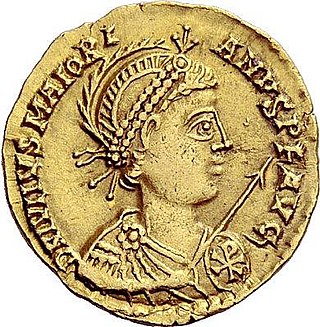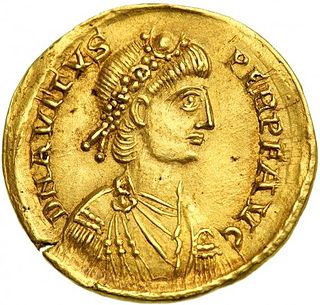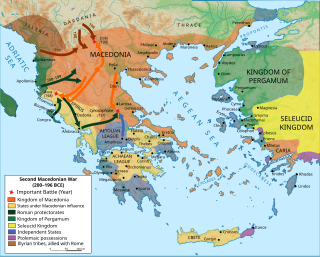
Sulpicius Severus was a Christian writer and native of Aquitania in modern-day France. He is known for his chronicle of sacred history, as well as his biography of Saint Martin of Tours.
AD 67 (LXVII) was a common year starting on Thursday of the Julian calendar. At the time it was known as the Year of the Consulship of Julius Rufus and Fonteius Capito. The denomination AD 67 for this year has been used since the early medieval period, when the Anno Domini calendar era became the prevalent method in Europe for naming years.

Majorian was the western Roman emperor from 457 to 461. A prominent general of the Roman army, Majorian deposed Emperor Avitus in 457 and succeeded him. Majorian was the last emperor to make a concerted effort to restore the Western Roman Empire with its own forces. Possessing little more than Italy, Dalmatia, and some territory in northern Gaul, Majorian campaigned rigorously for three years against the Empire's enemies. His successors until the fall of the Empire, in 476–480, were actually instruments of their barbarian generals, or emperors chosen and controlled by the Eastern Roman court.

Aulus Gellius was a Roman author and grammarian, who was probably born and certainly brought up in Rome. He was educated in Athens, after which he returned to Rome. He is famous for his Attic Nights, a commonplace book, or compilation of notes on grammar, philosophy, history, antiquarianism, and other subjects, preserving fragments of the works of many authors who might otherwise be unknown today.

Eparchius Avitus was Roman emperor of the West from July 455 to October 456. He was a senator of Gallic extraction and a high-ranking officer both in the civil and military administration, as well as Bishop of Piacenza.

Gaius Sollius Modestus Apollinaris Sidonius, better known as Sidonius Apollinaris, was a poet, diplomat, and bishop. Born into the Gallo-Roman aristocracy, he was son-in-law to Emperor Avitus and was appointed Urban prefect of Rome by Emperor Anthemius in 468. In 469 he was appointed Bishop of Clermont and he led the defence of the city from Euric, King of the Visigoths, from 473 to 475. He retained his position as bishop after the city's conquest, until his death in the 480s. He is venerated as a saint in the Catholic church, with his feast day on 21 August.
Servius Sulpicius Rufus, was a Roman orator and jurist. He was consul in 51 BC.

The Second Macedonian War was fought between Macedon, led by Philip V of Macedon, and Rome, allied with Pergamon and Rhodes. Philip was defeated and was forced to abandon all possessions in southern Greece, Thrace and Asia Minor. During their intervention, although the Romans declared the "freedom of the Greeks" against the rule from the Macedonian kingdom, the war marked a significant stage in increasing Roman intervention in the affairs of the eastern Mediterranean, which would eventually lead to Rome's conquest of the entire region.
The gens Sulpicia was one of the most ancient patrician families at ancient Rome, and produced a succession of distinguished men, from the foundation of the Republic to the imperial period. The first member of the gens who obtained the consulship was Servius Sulpicius Camerinus Cornutus, in 500 BC, only nine years after the expulsion of the Tarquins, and the last of the name who appears on the consular list was Sextus Sulpicius Tertullus in AD 158. Although originally patrician, the family also possessed plebeian members, some of whom may have been descended from freedmen of the gens.
Publius Sulpicius Rufus was a Roman politician and orator whose attempts to pass controversial laws with the help of mob violence helped trigger the first civil war of the Roman Republic. His actions kindled the deadly rivalry between Gaius Marius and Sulla, and provided the pretext for Sulla's unexpected march on Rome.
Riothamus was a Romano-British military leader, who was active circa AD 470. He fought against the Goths in alliance with the declining Western Roman Empire. He is called "King of the Britons" by the 6th-century historian Jordanes, but the extent of his realm is unclear. Some Arthurian scholars identify Riothamus as one of the possible sources of the legendary King Arthur.

Sigismund was King of the Burgundians from 516 until his death. He was the son of king Gundobad and Caretene. He succeeded his father in 516. Sigismund and his brother Godomar were defeated in battle by Clovis's sons, and Godomar fled. Sigismund was captured by Chlodomer, King of Orléans, where he was kept as a prisoner. Later he, his wife and his children were executed. Godomar then rallied the Burgundian army and won back his kingdom.
Saint Apollinaris Claudius, otherwise Apollinaris of Hierapolis or Apollinaris the Apologist, was a Christian leader and writer of the 2nd century.

Apollinaris of Ravenna is a Syrian saint, whom the Roman Martyrology describes as "a bishop who, according to tradition, while spreading among the nations the unsearchable riches of Christ, led his flock as a good shepherd and honoured the Church of Classis near Ravenna by a glorious martyrdom."
Apollinaris may refer to:
Apollinaris the Younger, also known as Apollinaris of Laodicea and Apollinarius was a bishop of Laodicea in Syria. He is best known as a noted opponent of Arianism. Apollinaris's eagerness to emphasize the deity of Jesus and the unity of his person led him to deny the existence of a rational human soul in Christ's human nature. This view came to be called Apollinarism. It was condemned by the First Council of Constantinople in 381.

Apollinaris is a naturally sparkling mineral water from a spring in Bad Neuenahr, Germany. Discovered in 1852, it was popularised in England and on the Continent and became the leading table-water of its time until about World War II. There are many references to it in high and popular culture. Today the brand is owned by Coca-Cola.
Marcus Porcius Cato Licinianus was son of Cato the Censor by his first wife Licinia, and thence called Licinianus, to distinguish him from his half-brother, Marcus Porcius Cato Salonianus, the son of Salonia. He was distinguished as a jurist.
Gaius Septicius Clarus, was a prefect of the Roman imperial bodyguard and influential as a friend and supporter of famous Silver Age authors Pliny the Younger and Suetonius.

Publius Sulpicius Quirinius, also translated as Cyrenius, was a Roman aristocrat. After the banishment of the ethnarch Herod Archelaus from the tetrarchy of Judea in AD 6, Quirinius was appointed legate governor of Syria, to which the province of Judaea had been added for the purpose of a census.









